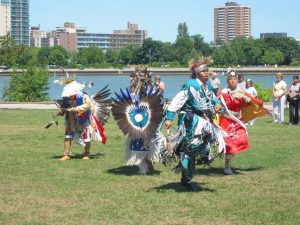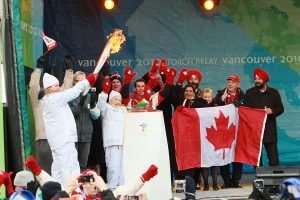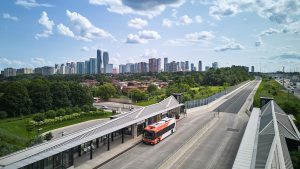History
The lands that make up present day Mississauga have roots that extend thousands of years before the 50th anniversary milestone. Mississauga has been shaped by Indigenous, immigrant and present day communities who make it the diverse, thriving and successful city it is today. Explore 50 years of milestones in the timeline, discover a deeper history in images, and read about the making of a city before incorporation.
The making of a City
The City of Mississauga is located on the Treaty and Traditional territory of the Mississaugas of the Credit, the Haudenosaunee Confederacy and the Wendat and Wyandot Peoples.
This land was purchased from the Mississauga people by the British crown in 1806 by a legal agreement called Treaty 14 (or the Head of the Lake Purchase) for the equivalent of only ten shillings.
The land was settled after the signing of a series of Treaties (14, 19, 22 and 23) with the Mississaugas which allowed for the settlement of the area.
These treaties made way for non-Indigenous people to settle the area in the early 19th century and their increased presence made it impossible for the Mississaugas to hunt and harvest the land and water they were promised would be shared.
Gradually, settlers began to take up land and over time, formed small settlements that grew into communities and villages. Eventually, the Mississaugas of the Credit were forced from these lands and are now located outside Hagersville, Ontario, at their reserve.
How Mississauga got its name
In 1965, the Township of Toronto applied to the Ontario Municipal Board to incorporate as a town and needed a new name. With the goal of uniting the villages and communities within its borders, the Township Council asked residents to send in suggestions for a new name.
Over 880 different names were suggested including:
- Birchwood
- Creditvale
- Fairfield
- Graydon
- Lakeland
- Oneida
- Springfield
- Westport
A sub-committee narrowed down the list to four: Malton, Mississauga, Peel and Sheridan. When the ballots were counted after the 1967 election, Mississauga was the overwhelming winner.
There are many different interpretations of how the word Mississauga came to exist with the most likely being that it is an Ojibwa word meaning “river of many mouths”. The City of Mississauga thanks and acknowledges the Anishinaabe peoples, who came to be known as the Mississaugas of the Credit, for allowing use of the name.
The Town of Mississauga
In 1968 the Town of Mississauga was created. To celebrate and christen the new Town, the 1968 New Year’s Eve ceremony took place in Cooksville Square outside City Hall, with Chief George King of the Mississaugas of the Credit First Nation in attendance.
In July 1968, Mayor Robert Speck visited the Mississaugas of the New Credit in Hagersville to present them with a grant to recognize the historical connection and friendly relations between the Mississaugas and the new town.
The City of Mississauga
In 1974, the Towns of Streetsville, Port Credit and the Township of Mississauga amalgamated to form the City of Mississauga. Starting with a population of approximately 250,000 residents in 1974, today, Mississauga has grown to over 717,000 residents.
-

Cows in the field at Weylie Farm, which is now Lake Aquitaine. Cows in the field at Weylie Farm, which is now Lake Aquitaine. -

2005 - Mississauga celebrates 200 years of friendship with the Mississaugas of the Credit First Nation. 2005 - Mississauga celebrates 200 years of friendship with the Mississaugas of the Credit First Nation. -

2009 - Olympic torch relay. 2009 - Olympic torch relay. -

2017 - Mississauga's Transitway officially begins service. 2017 - Mississauga's Transitway officially begins service.
A diverse cultural hub
Mississauga reflects the culturally rich and diverse original people and settlers who have chosen this city as their home.
Beginning in the late 1800s, Baltic, Croatian, Dutch, Greek, Irish, Italian, Polish, Portuguese and Ukrainian immigrants came here seeking new opportunities. In recent years, African, Asian, Caribbean, Middle Eastern and South American settlers have also made Mississauga their home. The people who make this City vibrant and dynamic bring with them a mosaic of languages, music, cultures and food that make Mississauga a warm and welcoming home to all.
As Canada’s seventh largest city, Mississauga is a key economic centre, attracting international talent, global investment and an enabling environment for businesses to thrive. We are a young city that has rapidly grown into a major hub for innovation and economic development.